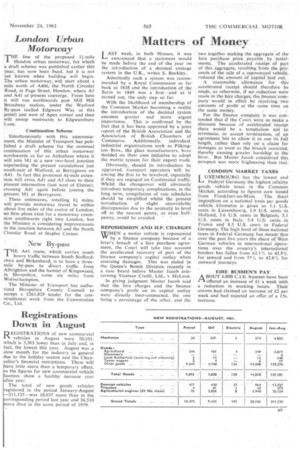Matters of Money
Page 43

If you've noticed an error in this article please click here to report it so we can fix it.
LAST week, in both Houses, it was -1-1 announced that a statement would be made before the end of the year on the introduction of a decimal coinage system in the U.K., writes S. Buckley.
Admittedly such a system was recommended by a Royal Commission as far back as t838 and the introduction of the florin in 1849 was a first—and as it turned out, the only step so far.
With the likelihood of membership of the Common Market becoming a reality the introduction of the decimal system assumes greater and more urgent importance. This is confirmed by the fact that it has been approved by a joint report of the British Association arid the Association of British Chambers of Commerce. Additionally, individual industrial organizations such as Pilkington Bros., the glass manufacturers, have decided on their own initiative to adopt the metric system for their export trade.
Obviously, should its introduction be approved, transport operators will be among the first to be involved, especially if they are engaged on Continental traffic. Whilst the changeover will obviously introduce temporary complications, in the long term, compilation of rate schedules should be simplified whilst the present introduction of slight unavoidable discrepancies due to the necessity to level off to the nearest penny, or evenhalfpenny, could be avoided. •
REPOSSESSION AND 11.P: CHARGES
WHEN a motor vehicle is repossesied Vic by a finance company because of a hirer's breach of a hire purchase agreement, the Court will take into account the accelerated recovery of part of the finance company's capital outlay when assessing damages. This was stated in the Queen's Bench Division recently in a case heard before Master Jacob concerning -Yeoman Credit, Ltd., v McLean.
In giving judgment Master Jacob said that the hire charges and the finance 'company's profit on its capital outlay were directly inter-connected, the one being a percentage of the other, and the two together making the aggregate of the hire purchase price _ payable by instalments. The accelerated receipt of part of this aggregate, resultibg from the proceeds of the sale of a repossessed vehicle, reduced the amount of capital laid out.
A reasonable , allowance for this accelerated receipt should therefore be made, as otherwise, if no reduction were made in the hire charges, the finance company would in effect be receiving, two amounts of profit at the same time on the same money.
For the finance company it was contended that if the Court were to make a discount because of accelerated receipt there would be a temptation not to terminate, or accept termination, of an agreementhnt to allow it to run its full length, rather than rely on a claim for damages as soon as the breach occurred, thereby causing greater hardship to the hirer. But Master Jacob considered this prospect was more frightening than real.
COMMON MARKET TAXES UXEMBOURG has the lowest and 1-4 Federal Germany the highest relative goods vehicle taxes in the Common Market, according to figures now issued from Frankfurt-on-Main. The fiscal imposition on a national basis per goods vehicle kilometre is given as 1.1 U.S. cents in Luxembourg, 1.9 U.S. cents in Holland, 3.6 U.S. cents in Belgium, 5.1 U.S. .cents in Italy, 5.4 U.S: cents in France and 8.5 U.S. cents. in Federal Germany. The high level of these national taxes in Federal Germany has meant that over the past five years the share of West German vehicles in international operations over the country's international borders has fallen from 62.1% to 42.9% for inward and from 57% to 42.8% for outward journeys.
EIRE BUSMEN'S PAY
ABOUT 6,000 C.I.E. busmen have been offered an increase of £1 a week with a reduction in working hours. Their unions had claimed an increase of £2 per week and had rejected an offer of a 15s. increase.




















































































































